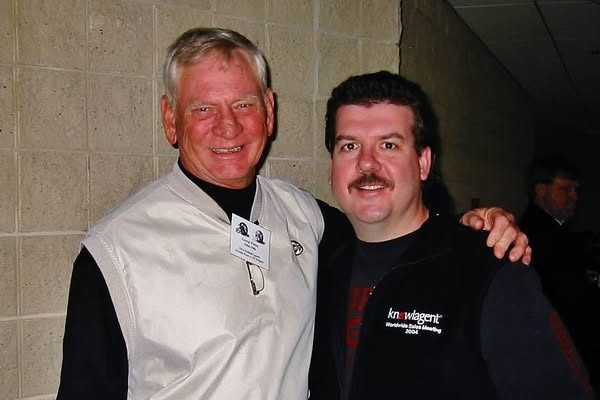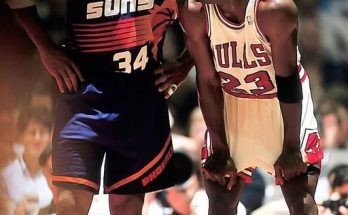The University of Georgia football community is in mourning following the passing of one of its most celebrated and respected legends, George Patton. Known affectionately as “The General,” Patton was more than just a powerhouse on the gridiron — he was a man whose leadership, sportsmanship, and dedication to his team defined what it truly means to be a Georgia Bulldog. His career and legacy stretch far beyond the statistics and accolades he amassed during his years in Athens, resonating deeply with fans, teammates, and the entire Bulldog Nation.
Patton’s football journey at Georgia coincided with one of the program’s most defining eras. As a defensive tackle, he was a constant force on the field, disrupting offenses with his strength, agility, and football IQ. A two-time All-American and a three-time All-SEC selection, Patton’s dominance in the trenches earned him national recognition and cemented his place in college football history. His achievements weren’t just personal triumphs; they reflected the determination and collective will of the Bulldogs during the 1960s, an era when the SEC was fiercely competitive and every game demanded grit.
One of the crowning moments of Patton’s career came in 1966, when he captained the Georgia Bulldogs to an SEC Championship. That season is still remembered with reverence in Athens, particularly for the memorable victory over Steve Spurrier and the Florida Gators — a game often referred to by Georgia fans as the “Spurrier Slaughtering.” It was a showcase of Bulldog defensive excellence, and Patton was at the heart of it. His leadership on and off the field played a pivotal role in rallying his teammates, creating an environment of discipline, mutual respect, and unyielding effort.
Patton’s nickname, “The General,” was no mere embellishment. Like a skilled military commander, he understood strategy, positioning, and the importance of leading by example. His work ethic during practice and games inspired those around him. He was known for holding himself to the highest standards, and he expected the same from his teammates — not out of arrogance, but from a genuine belief in their collective potential. Players who lined up beside him often spoke of the quiet confidence he instilled, a confidence born from knowing that if Patton was on the field, the Bulldogs always had a fighting chance.
Beyond the gridiron, George Patton was a gentleman in every sense of the word. He carried himself with humility despite his storied accomplishments and treated everyone — from fellow athletes to young fans — with kindness and respect. His deep connection to the Georgia community extended far beyond his playing days. He remained a proud ambassador for the program, often attending games, alumni events, and charitable functions. Those who knew him personally often recall how approachable he was, quick to share a laugh or a story from his playing days.
Patton’s impact can also be measured by the enduring admiration of Georgia fans. Decades after his final college game, he continued to be held up as an example of what it means to be a “DGD” — a Damn Good Dawg. In Georgia football culture, this is a title earned through unwavering loyalty, excellence on the field, and integrity in life. Patton embodied that ethos perfectly. His toughness as a player never overshadowed his graciousness as a man, making him a rare figure who was equally respected by rivals and loved by supporters.
His passing is a poignant reminder of how figures like Patton form the living history of college football programs. The memories of his dominant performances and the pride he brought to Georgia are interwoven with the very identity of the Bulldogs. Players of today’s generation might not have seen him play live, but they walk the same halls and take the same field that Patton once did, inspired by the stories and legacy he left behind. In this way, his influence persists — every defensive tackle who puts on the red and black stands on the foundation he helped build.
The “Spurrier Slaughtering” victory in 1966 remains one of the defining games in Georgia lore, and Patton’s role in it has become a cornerstone of that legend. It wasn’t just about defeating a rival; it was about establishing Georgia as a powerhouse in the SEC, capable of taking on the best and emerging victorious. Patton’s performance that day — fierce, disciplined, and relentless — became a snapshot of what Bulldog football could be at its best. Fans still recall the roar of the crowd and the sense of pride that washed over Athens in the aftermath, much of which was due to the efforts of their steadfast captain.
In remembering George Patton, it is impossible to overlook the cultural significance of players from his era. College football in the 1960s was a different game — one that demanded resilience and physicality in ways that modern football sometimes shields players from. Patton thrived in that environment, making his mark through a combination of raw talent and sheer determination. His legacy bridges the gap between past and present, reminding today’s athletes of the roots of Georgia’s success.
Tributes have poured in from across the Bulldog community since the news of his passing broke. Former teammates have shared heartfelt memories, speaking of his leadership, his sense of humor, and his unwavering friendship. Coaches have praised the standard he set for excellence, noting that his influence on the program’s culture can still be felt today. Fans, some of whom never had the chance to see him play, have expressed their gratitude for the pride he brought to the Georgia name. It’s a testament to the reach of his legacy — one that extends far beyond the boundaries of the football field.
For the Patton family, this is a time of both grief and celebration. Grief for the loss of a husband, father, grandfather, and friend who enriched the lives of everyone around him. Celebration for a life lived with purpose, honor, and impact. George Patton’s story is not simply the tale of an athlete who achieved greatness; it’s the story of a man who understood the responsibility that came with wearing the Georgia “G” on his helmet. He embraced that responsibility, carried it with pride, and left the program better than he found it.
As Bulldog Nation says goodbye to one of its most treasured icons, the memories of his performances, his leadership, and his character will live on. In Sanford Stadium, where the echoes of past victories still linger, one can imagine the roar of the crowd on a crisp autumn afternoon in 1966, the moment when “The General” led his Dawgs to glory. That spirit, that pride, and that legacy will never fade.
Rest in peace, George Patton. You were, and always will be, a Damn Good Dawg. Your contributions to Georgia football and to the countless lives you touched will be remembered with love and respect for generations to come. In every defensive stand, in every hard-fought win, and in every cheer that rises from the red and black faithful, your presence will be felt. God bless you and your family, and thank you for showing us what it truly means to be one of the greatest Bulldogs of all time.



